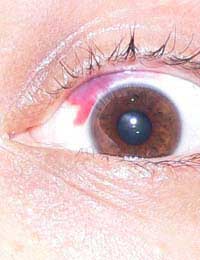Is a Vitreous Haemorrhage Serious?

The description vitreous haemorrhage sounds dramatic and serious; although it can be a cause for concern and an explanation for sudden vision loss, it does not involve the loss of a lot of blood. A vitreous haemorrhage occurs inside the gel-filled interior of the eyeball. Usually caused by a tear in the retina, just tiny amounts of blood are released. Nevertheless, the impact of this blood on someone’s ability to see can be quite dramatic. If there is enough blood, this will stop light passing through the eyeball to reach the retina, and the person affected will experience sudden vision loss, which will last until the bleeding stops and until the blood is absorbed.
Less severe bleeds into the vitreous cause the appearance of floaters in the visual field. These look like blobs or floating jelly fish and are caused by fragments of blood floating around in the vitreous gel.
What Causes Vitreous Haemorrhage?
The usual cause of bleeding into the eyeball is an underlying health condition that affects the eyes and that results in tearing or damage to the retina. It can occur in people with diabetic retinopathy, retinal vein occlusion, age-related macular degeneration, eye damage due to sickle cell anaemia, or in newborn babies because their retinas have not had time to mature and tear easily.In healthy people with no eye conditions the primary cause of vitreous bleeding is an injury sustained in a blow to the head. This can occur as a result of a fall, car accident or other trauma.
Rarely, people with a genetic condition or syndrome in which the blood vessels are prone to rupture can also experience vitreous haemorrhage. They are also very prone to subarachnoid haemorrhages and other ruptured blood vessels, which can cause problems in the brain and many other body organs.
Is it an Emergency?
Any bleeding inside the eye should be treated as an emergency if it happens spontaneously or in an accident as it usually indicates a retinal tear than needs to be repaired surgically to save someone’s sight as far as possible. The bleeding itself will stop quite quickly if it is due to a retinal disease but the tear that has lead to the bleeding cannot heal itself and any vision loss due to damage to the nerve connections will be irreversible.Diagnostic methods used to find out the cause of a vitreous haemorrhage include using an ophthalmoscope, measuring the pressure within the eyeball, using ultrasound scanning and using a fundoscope to examine the back of the eye to see the retina. Once the source and reason for the bleeding has been identified, the correct treatment can then be started as soon as possible.
Treatment for a Vitreous Haemorrhage
Diagnosing the cause of a vitreous haemorrhage needs to be done quickly so that the person affected can start bed rest as soon as possible. It is important to avoid strenuous activity, and to raise the head of the bed so that blood flow to the head during sleep is lessened. This also allows the blood in the eyeball to settle, allowing easier access for a fundoscopy examination. This involves having a camera look directly through the pupil of the eye to see the back of the retina, and to examine it for damage. Until the blood clears, it is too murky to see anything clearly enough for a proper diagnosis.If the retina needs to be repaired, an emergency operation called a vitrectomy could then be necessary. Once this has been done, it is important to monitor the vitreous to make sure that the blood clears away, and then to assess any change to the vision. Follow up could then take months or even years to make sure that no further damage occurs and any worsening of the underlying eye condition is dealt with quickly.







